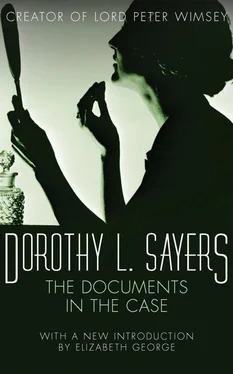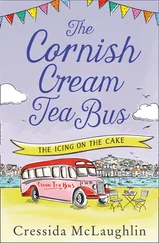Dorothy Sayers - The Documents in the Case
Здесь есть возможность читать онлайн «Dorothy Sayers - The Documents in the Case» весь текст электронной книги совершенно бесплатно (целиком полную версию без сокращений). В некоторых случаях можно слушать аудио, скачать через торрент в формате fb2 и присутствует краткое содержание. Жанр: Классический детектив, на английском языке. Описание произведения, (предисловие) а так же отзывы посетителей доступны на портале библиотеки ЛибКат.
- Название:The Documents in the Case
- Автор:
- Жанр:
- Год:неизвестен
- ISBN:нет данных
- Рейтинг книги:5 / 5. Голосов: 1
-
Избранное:Добавить в избранное
- Отзывы:
-
Ваша оценка:
- 100
- 1
- 2
- 3
- 4
- 5
The Documents in the Case: краткое содержание, описание и аннотация
Предлагаем к чтению аннотацию, описание, краткое содержание или предисловие (зависит от того, что написал сам автор книги «The Documents in the Case»). Если вы не нашли необходимую информацию о книге — напишите в комментариях, мы постараемся отыскать её.
The Documents in the Case — читать онлайн бесплатно полную книгу (весь текст) целиком
Ниже представлен текст книги, разбитый по страницам. Система сохранения места последней прочитанной страницы, позволяет с удобством читать онлайн бесплатно книгу «The Documents in the Case», без необходимости каждый раз заново искать на чём Вы остановились. Поставьте закладку, и сможете в любой момент перейти на страницу, на которой закончили чтение.
Интервал:
Закладка:
Mr Harrison had been accustomed to take an annual holiday ‘on his own’ at ‘The Shack’, living a bachelor existence, and making the experiments in natural cookery in which he was interested. He also painted in water-colours. On Mr Lathom’s return to England, in October, Mr Harrison had suggested that he should join him in his residence at ‘The Shack’. They had gone down there together on Saturday, the 12th of October, and had passed a very enjoyable holiday.
The Coroner : Will you explain the arrangements made about obtaining supplies of food and so on? — Bread, meat and vegetables were brought, when required, by the carrier, who called on Monday and Thursday, and took the orders for his next visit. A supply of tinned food, including condensed milk, was kept in ‘The Shack’. There was no delivery of newspapers. Letters were fetched from the post office at Manaton by anybody who happened to be walking that way, or brought by the carrier on his visits.
Who did the cooking and housework? — We shared the work of washing up, carrying wood and so on. Mr Harrison did all the cooking. He was a first-class cook.
Did he supplement the fresh and tinned meat and so on, with what may be called experiments in natural diet? — Oh yes. One evening we had swealed hedgehog, for example, (Laughter.)
Was it good? — It was delicious. (Laughter.)
‘I NEVER ATE ANY TOADSTOOLS’
The Coroner : Hedgehog — Was that the only unconventional dish you saw prepared? — No. On two or three occasions Mr Harrison gathered fungi of various kinds and had them for breakfast or supper.
Did these fungi include the ordinary mushroom of commerce? — On one occasion, yes.
Did you eat any of that dish? — I ate a small quantity. I do not care very much for mushrooms.
And on the other occasions? — On, I think, two occasions, Mr Harrison brought in other fungi, which, he explained, were good to eat. A great number of fungi are to be found in the valleys and damp, low-lying spots in the neighbourhood. One variety was called, I believe, Chanterelles, or some such name, and there was also a purple one, called ‘Amethyst’ something-or-other.
These were fungi of a kind not usually eaten by the ordinary person? The sort commonly called toadstools. — Yes; common, wild fungi.
Was the flavour of them agreeable? — I do not know. They smelt very savoury, but I did not eat any of them.
How was that? — I did not think it was safe. I was afraid of eating something poisonous.
You knew that a great many edible varieties of fungi exist in addition to the common mushroom? There is a Government publication dealing with them, I believe? — I believe there is.
And Mr Harrison was considered an authority on the subject? — I do not know if he was generally so considered. He had devoted much attention to the subject and had written a book on our natural food resources.
Had you read the book? — I had read parts of it.
But you did not feel sufficient confidence in the deceased’s judgement to partake of the toadstools yourself? — I suppose I did not. These things are largely a matter of prejudice. I did not care about the idea of eating toadstools.
UNHEEDED WARNINGS
The Coroner : But Mr Harrison ate them and was none the worse. — Oh, certainly. He appeared to enjoy them very much and there were no ill-effects.
Did you ever remonstrate with the deceased about his habit of eating these dangerous fungi? — I told him I was afraid there would be an accident some day. The subject had frequently been mentioned previously, when he was preparing his book. Mrs Harrison and his friends often said, more or less jokingly, that there would be a coroner’s inquest on him one of these days.
And how did the deceased receive these warnings? — He laughed, and said it was all ignorance and prejudice. He said there was no danger at all for anybody who had thoroughly studied the subject.
Can you tell us how these dishes of fungi were prepared? — He had several methods. Sometimes he would grill them with butter and garlic, and other times he would stew them with condensed milk or in beef stock. He was fond of inventing new methods of cooking things.
‘I AM GOING TO HUNT FOR FUNGI’
The Coroner : Now let us come to the time of the death. You had gone up to London, I think? — Yes. I had occasion to consult my agents and to transact a few matters of business in town. I went up by the 8.13 from Bovey Tracey on the Thursday morning. I had ordered a taxi the day before.
Was Mr Harrison quite well when you left him? — Perfectly. He was in particularly good spirits. He had risen early, with the intention of gathering a certain kind of fungus for his supper. It was one particular sort which he said he knew where to get.
Do you recollect its name? — I am not sure. I think he called it ‘Warty Hat’. (Laughter.) He said he knew of a wood where it was very plentiful.
I have here a copy of Mr Harrison’s book. I see there is a fungus mentioned as being of an edible nature, called ‘Warty Caps’. Would that be the one? Its Latin name is Amanita rubescens . — I should think that would be the one.
Had Mr Harrison started out before you left? — No. He saw me off at the gate into the lane.
POISONED DEATH AGONY
Mr Lathom then stated that he had returned to ‘The Shack’ late on Saturday night, bringing with him Mr John Munting, a mutual friend of himself and the Harrisons, and the author of a successful novel.
Arriving at ‘The Shack’ at about eleven o’clock, they found the place in darkness and the fire out. The remains of a dish of mushrooms was on the table in the outer room, together with the shells of some boiled eggs, a loaf of bread and a cup one-quarter filled with coffee.
On penetrating into the inner room, they discovered the body of Harrison, lying half-dressed on the bed. It was cold when found, and the features much distorted. Various articles in the room were flung about in a disorderly fashion, and the trestle-bedstead was broken. Both in this and in the outer room there were signs that the dead man had vomited persistently. A bottle of whisky and a tumbler were found beneath the bed.
As there is no telephone communication between ‘The Shack’ and Manaton, Mr Lathom was obliged to go on foot to summon assistance. The landlord of the inn at Manaton telephoned to the police-station at Bovey Tracey. Sergeant Warbeck, who received the message, communicated at once with Dr Hughes, and proceeded in the doctor’s car to the scene of the tragedy.
The Coroner : Was Mr Harrison a man of cheerful disposition? — He was a reserved man of quiet tastes and behaviour on the whole, though subject to occasional fits of annoyance about trifles.
During the time you were with him at ‘The Shack’, did he appear to have anything on his mind? — Certainly not: he was in excellent spirits.
In your opinion, he was not a man likely to lay violent hands on himself? — Far from it. I was convinced at the time, and still am, that his death was a pure accident, due to some fungi he had eaten.
It came as a great surprise to you? — Well, of course, I was very much shocked and upset, but when I came to think it over — no, I cannot say I was greatly surprised.
Dr Hughes gave evidence that he had examined the body of Harrison and formed the opinion that when seen by him at about 1.30 a.m. deceased had been dead seven or eight hours. He had had the body removed to Bovey Tracey for the purpose of an autopsy. Acting in collaboration with the police, he had sent certain organs, portions of bed-linen, and remains of food to be chemically analysed.
The Coroner : At this point of the inquiry, can you form any conclusion as to the cause of the death? — The appearances suggest that deceased was poisoned by some substance which produced violent sickness and diarrhoea, followed by prolonged delirium and convulsions, ending in coma and death. The pupils of the eyes were slightly contracted, suggesting also the action of a poison.
Читать дальшеИнтервал:
Закладка:
Похожие книги на «The Documents in the Case»
Представляем Вашему вниманию похожие книги на «The Documents in the Case» списком для выбора. Мы отобрали схожую по названию и смыслу литературу в надежде предоставить читателям больше вариантов отыскать новые, интересные, ещё непрочитанные произведения.
Обсуждение, отзывы о книге «The Documents in the Case» и просто собственные мнения читателей. Оставьте ваши комментарии, напишите, что Вы думаете о произведении, его смысле или главных героях. Укажите что конкретно понравилось, а что нет, и почему Вы так считаете.












